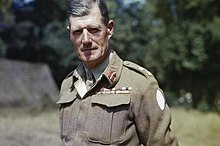Sir John Crocker | |
|---|---|
 | |
| Nickname(s) | "Honest John" |
| Born | 4 January 1896 Catford, Lewisham, London, England |
| Died | 9 March 1963 (aged 67) London, England |
| Allegiance | United Kingdom |
| Service | British Army |
| Years of service | 1915–1919 1920–1953 |
| Rank | General |
| Service number | 10435 |
| Unit | Artists Rifles Machine Gun Corps Middlesex Regiment (Duke of Cambridge's Own) Royal Tank Corps |
| Commands | Adjutant-General to the Forces (1950–53) Middle East Land Forces (1947–50) Southern Command (1945–47) I Corps (1943–45) IX Corps (1942–43) XI Corps (1942) 6th Armoured Division (1940–41) 3rd Armoured Brigade (1940) |
| Battles / wars | First World War Second World War Palestine Emergency |
| Awards | Knight Grand Cross of the Order of the Bath Knight Commander of the Order of the British Empire Distinguished Service Order Military Cross Mentioned in Despatches (2) Grand Officer of the Order of Orange-Nassau (Netherlands) |
| Other work | Vice-Chairman of the Commonwealth War Graves Commission Lord Lieutenant of Middlesex |
General Sir John Tredinnick Crocker, GCB, KBE, DSO, MC (4 January 1896 – 9 March 1963) was a senior British Army officer who fought in both world wars. He served as both a private soldier and a junior officer in the First World War. During the Second World War he served as a distinguished brigade, division and corps commander, where his most notable role was as General Officer Commanding (GOC) of I Corps during the D-Day landings on 6 June 1944, leading the corps throughout the subsequent campaign in Western Europe until Victory in Europe Day (VE-Day) just over eleven months later.
After the war was over Crocker became Commander-in-Chief (C-in-C) of Middle East Land Forces and Adjutant-General to the Forces, the second most senior officer on the Army Council. An outstanding soldier, Crocker was highly regarded by both his superiors, most notably Field Marshal The Viscount Alanbrooke, and his subordinates, including the future Field Marshal Lord Carver, but he remains relatively unknown.